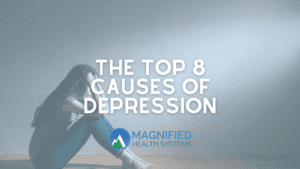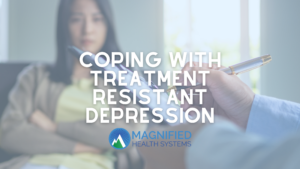The best treatment for depression is one that considers each person’s specific needs. Although that may sound obvious, people with depression struggle in different ways and can benefit from multiple forms of therapy. Working with a trauma-informed professional is one of the most important aspects of a successful treatment plan because a trauma-informed approach considers each individual’s energy levels and trauma history to determine what kind of support will be most beneficial for them. Treatment options for depression may include a combination of talk therapy and somatic therapies, taking medication such as antidepressants, and lifestyle adjustments, including getting plenty of exercise and time in nature.
Although there are several kinds of depression, ranging from bipolar depression to dysthymia and major depressive disorder, they share some common tell-tale signs and symptoms. People with depression often experience mood swings, intense feelings of sadness and despair, and high levels of irritability. Some other symptoms associated with most types of depression include:
Also known as psychotherapy, talk therapy helps people release pent-up painful emotions and stress. Therapy is a process of self-discovery that helps people make connections between their thoughts, feelings, and emotions. Speaking to a mental health professional in a safe environment is a useful way for people to process their emotions effectively and can be the starting point for creating positive changes.
People struggling with depression often suffer in silence because of the stigma associated with mental health issues, and talk therapy helps them break that silence and develop healthy coping skills. Being heard by a compassionate therapist is often a very healing process in and of itself, as are group therapy sessions with peers who are experiencing similar issues.
Depression is a family issue – in more ways than one. Not only does research show that there may be a genetic predisposition associated with depression, but depression is also related to family dynamics, trauma, and dysfunction. If someone is depressed, there are likely social and emotional structures within their family that reinforce the issues that are making them depressed. This is why family therapy is needed, to help restructure the dynamics of the family unit.
All members of the family unit can benefit from attending therapy as a group, because each person is affected by the overall dynamic. A competent therapist will be able to observe critical issues that are making things challenging, and can ask questions that help each individual understand how they may have been contributing to the situation. With new awareness comes the freedom to make new choices, and therapy can help each family member become more conscious of how their thoughts and feelings impact their behavior.
Cognitive-behavioral therapy is a popular form of talk therapy that implements specific strategies to help people manage their feelings and make better choices. Other forms of psychotherapy are more open-ended, while cognitive-behavioral therapy is structured and teaches specific tools and life skills, which is especially beneficial for people with depression. Some of these skills can include goal setting, time management tools, and self-regulation techniques such as breathwork and meditation.
Being in nature is incredibly healing and regulating for anyone experiencing depression. Getting physical activity in nature – even something as simple as gardening or going for a walk on the beach – can help improve serotonin levels in the brain and elevate your mood. Our modern lifestyles contribute to depression because we spend a lot of time indoors with artificial light, and it’s easy to be sedentary most of the time. Getting natural sunlight and fresh air every day, on the other hand, is one of the best things you can do to feel rejuvenated and peaceful. Here are some holistic outdoor activities that families can enjoy together:
Not getting enough physical and mental exercise contributes to depression. Studies show that physical activity is a natural antidepressant that can help improve a person’s moods and energy levels. Although many people with depression also struggle with fatigue and may not have enough energy for running or sports, gentle forms of movement including tai chi and yoga are great ways to get started. Choosing a form of physical activity that also requires focus and learning new skills is a good way to create new neural pathways, which is very helpful for anyone struggling with depression. Here are some engaging activities that you can try:
At Magnified, we have years of experience treating mental health disorders. We specialize in treating depression and offer programs that are tailored to meet your specific needs. Untreated depression and anxiety only get worse as time goes on, and can increase the risk of self-harm and suicide. Mental health disorders can be triggered by a lack of sleep, poor sleep hygiene, and unmanageable stress. Signs of stress include disrupted sleep patterns, irritability, and social isolation. If you or a loved one are struggling with depression, contact us today.
Get confidential help 24/7. Call now for:
Related Articles
Get Help Now
Medical Advice Disclaimer
Magnified Health Systems aims to improve the quality of life for people struggling with substance use or mental health disorder with fact-based content about the nature of behavioral health conditions, treatment options and their related outcomes. We publish material that is researched, cited, edited and reviewed by licensed medical professionals. The information we provide is not intended to be a substitute for professional medical advice, diagnosis or treatment. It should not be used in place of the advice of your physician or other qualified healthcare providers.

Dr. Bickley graduated from U.C. Irvine with honors: Phi Beta Kappa, Golden Key International Honor Society, Cum Laude. He has been featured on national radio and print media. He is also a frequent lecturer at National Conferences. He holds an A.S. degree in Drug & Alcohol Studies, and two B.A. degrees in Criminology & Psychology, and masters and doctoral degree in Clinical Psychology. He is a licensed California Drug & Alcohol Counselor Level II, a licensed Clinical Supervisor and is certified in treating Eating Disorders.

Have you ever pondered the root reasons for clinical depression? Perhaps a significant depression diagnosis has led you to wonder why some people experience depression while others do not. Depression is a complicated scenario. Although there are many potential causes, no one is certain of their actual cause.

Even with effective treatment, major depression does not always go away, and persistent or challenging-to-treat depression has been shown to add to the significant disease burden brought on by depression.
Call Us Now, Our Admissions Team Is Standing By And Available 24/7.

Head Office Location:
1530 N Federal Hwy Lake Worth, FL 33460
Contact & Feedback:

We are here for you.
We are here for you, Call us and get started!
